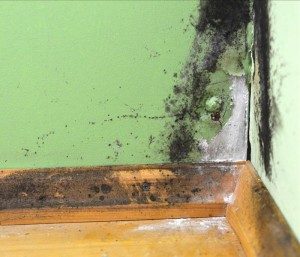Mold in Your Rental: Who is Responsible?

If you find mold in your rental property, make sure you notify your landlord right away.
While it may seem like mold is only a concern for people who own homes, this fungal foe can actually be a concern for renters as well. Rental properties are just as susceptible to mold growth. If you are experiencing some of the health effects of mold, it is definitely time you did something about it. But what should you look for and when is your landlord liable for the mold? Let’s take a look at who is responsible for mold in your rental property.
Who is Responsible for Mold in Your Rental?
Unfortunately, with a few exceptions, the landlord responsibilities for mold have not been clearly defined by the building codes, ordinances, statutes, and regulations of the state. Few states and cities actually have mold laws in place to protect the renters. While there is no federal law that sets permissible exposure limits or building tolerance standards for mold in residential buildings, there are some state laws in place. These laws are in California, Indiana, Maryland, New Jersey, and Texas are aimed at developing guidelines and regulations for mold in the indoor air.
Laws in Maryland
Maryland tenants have a legal right to a rental property that meets basic structural, health, and safety standards that are in good repair. If a landlord fails to take important maintenance steps like mold remediation, you have several legal rights including withholding rent until repairs are made to the property. However, before withholding rent, make sure to read the laws regarding your right to withhold. Some landlord often include a clause about mold in the lease. Unfortunately, this could absolve them of any liability resulting from mold growth in the rental property.
Preventing Mold is a Joint Effort
While not every mold situation can be prevented, it is important for you and the landlord to work together in order to prevent mold from happening. One way you can do this is to alert the landlord immediately that there is a problem. If you notice a leak or something wrong in the house that could lead to mold, make sure to alert the landlord of the problem before taking other measures. If the landlord doesn’t help, there are some self-help strategies you can implement in Maryland. These things include rent withholding as well as repair and deduct strategies. When using the repair and deduct method, you can actually take care of the mold cleanup on your own and subtract the cost of this cleanup from the rent. This will cut out the “middleman” and let you get the job done quickly to avoid health problems. But you should be careful of withholding any amount of rent until you advise a court of the situation and take the proper steps needed to address the problems.
Although many renters refuse to take care of these problems on principle, the longer mold is left in your rental, the harder it is to address the problem and the more health effects you may feel. For more information on mold remediation, call All Aspects Waterproofing today!
Mold in Your Rental with All Aspects Waterproofing
If you are ready to get a professional to take care of your residential or commercial water-sensitive flooring needs, contact All Aspects Waterproofing, a Better Business Bureau A+ rated company with over 30 years of experience in the Washington, DC./Maryland/Virginia area. Contact us online or by calling 1-866-999-3110 or 301-766-4420. To see what we’re up to, follow us on Facebook, Twitter, Google+, Pinterest, YouTube, LinkedIn, and Houzz.
